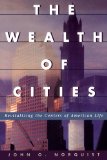The Wealth of Cities by John Norquist – Book Review
Milwaukee’s former Mayor, John Norquist, in his 1998 book The Wealth of Cities writes up the impacts of U.S. policies on our cities, lays out his foundational beliefs that today form a key plank of the New Urbanism movement, and shares his insight into how he believes cities should be governed.
Covering a bit of history the book explores how a variety of public policies have negatively impacted cities and encouraged the rise of, as he calls it, “the mediocre suburb.” One such example that he points to is how zoning regulations have negatively impacted density in cities, and in turn decreased the number of affordable housing units available in a city. FHA mortgage insurance and home loan programs are another example of public policy that has had a negative impact on cities. He gives the history of how these policies have subsidized single-family home development and suburban sprawl, furthering the decline of the core.
Beyond the typical urbanist discussions, he touches on his own personal beliefs and concepts in regards to city governance. As a self-proclaimed “New Democrat” he writes about his long list of cost-saving budget measures, such as avoiding the use of one-time grants as they, in his opinion, lead to future budget holes. The choice school voucher system is another area which he covers, comparing it to the G.I. Bill and Pell Grants, arguing that those programs haven’t hurt public universities, so therefore the choice system should be supported because improving education is vital to a city’s future. The Broken Windows Theory of policing is yet another non-traditional urbanist area that he touches on, arguing that public safety is key to the success of any city, and this model of policing is a strong way to deliver safety. Straying into national politics, he even points out the value of immigration to our cities, saying “Cities are the soil in which commerce grows. One ingredient vital to such growth is people. Immigration has always been a source of strength for cities.”
Often New Urbanism is viewed as a discussion of merely the built environment, and that is a primary focus, but as his writing shows urbanism is about much more than buildings.






















Throughout the book he talks about “the free market” as a force of nature that acts by itself rather than as the aggregate of many different forces, interests, influences and things more and less “free” from different types of constraints. This is the same naive or propagandist rhetoric of right wing radio that we can now see clearly as the tools of corporate America. They don’t recognize Norquist’s new (now establishment) corporate Democrat as a fundamental ally, but that’s what they are. There’s not a lot left of the left or liberalism–it’s basically country club pre-Ford Republicanism. A lot more sane and tasteful than today’s reactionary right, but the master ideology is about resisting distribution of wealth and concentrating it in the hands of a few while pushing societal costs to those with far less.
Can’t Build a City on Pity.
Words to live by. Cities are better, but we too often resort to begging.